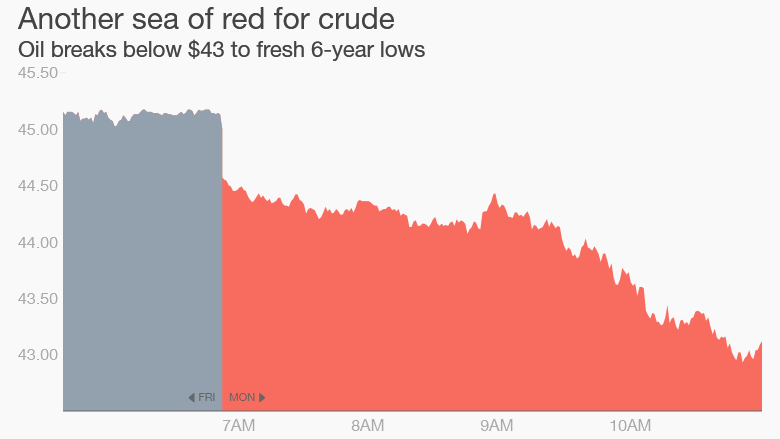Rice
Resident Smart Arse
The yuan dropped the most in two decades, sparking a tumble in Asian currencies after China devalued its exchange rate to combat an economic slowdown. Commodities fell, while Hong Kong shares and U.S. Treasuries gained.
The yuan dropped 1.9 percent to 6.3270 per dollar as of 1:25 p.m. in Hong Kong, after the central bank cut its reference rate by a record and said market forces will play a greater role. It was the biggest one-day loss since China unified official and market exchange rates in 1994. The Bloomberg JPMorgan Asia Dollar Index sank to the lowest level since 2009, while a gauge of commodities lost 0.7 percent. Yields on 10-year Treasuries dropped three basis points. The Hang Seng China Enterprises Index advanced 1.3 percent.
China’s devaluation follows economic reports this month showing a plunge in exports, weaker-than-estimated manufacturing and slowing credit growth. Policy makers in the biggest emerging market are trying to balance calls for economic stimulus against long-term goals of increasing the role of markets and cutting back on debt-fueled investment.
“Policy makers and the central bank are still very concerned about the overall economic-growth momentum,” said Qian Wang, Hong Kong-based senior economist for Asia Pacific at Vangaurd Group Inc. “China has suffered because of the strengthening of the currency.”
One-Time Move
The People’s Bank of China cut its daily reference rate for the currency by a record 1.9 percent. The change was a one-time adjustment, the central bank said in a statement, adding that it plans to keep the yuan stable at a “reasonable” level and will strengthen the market’s role in determining the fixing.
The currency’s closing levels in Shanghai were restricted to 6.2096 or 6.2097 versus the dollar for more than a week through Monday and daily moves have been a maximum 0.01 percent for a month.
The devaluation triggered declines of at least 1 percent in the currencies of Australia, South Korea and Singapore, whose currency fell the most since 2011. Criticism may be muted given the recent history of competitive devaluations globally, according to Bloomberg Economics analysts Tom Orlik and Fielding Chen.
The yuan slid 2.2 percent in offshore trading in Hong Kong, trading at the weakest level since September 2012.
Shanghai Composite
The MSCI Asia Pacific Index dropped 0.6 percent, while futures on the Standard & Poor’s 500 Index declined 0.4 percent. The Shanghai Composite Index was little changed as airlines sank on concern a weaker yuan will increase the burden of their dollar-denominated debt and hurt earnings.
The Bloomberg Commodity Index lost 0.6 percent after surging 2.4 percent Monday. Gold for immediate delivery retreated 0.5 percent to $1,099.30 an ounce Tuesday, while silver, platinum and palladium also weakened. Copper, nickel, lead, tin and aluminum dropped at least 1 percent in London.
“The depreciated yuan will reduce resources imports by China,” said Ren Gang, Vice General Manager of private trading house Qingdao Youbangyuan Trading Co., in Shanghai. “That’s bearish news for global commodities, but could help China squeeze its capacity glut.”
Treasuries rose as the yuan’s retreat boosted the appeal of dollar-denominated assets. U.S. 10-year note yields fell to 2.18 percent, according to Bloomberg Bond Trader data. The Bloomberg Dollar Spot Index, which tracks the greenback against 10 of its most-traded peers, advanced 0.5 percent.
http://www.bloomberg.com/news/artic...s-buoyed-by-u-s-gains-as-oil-maintains-bounce
The yuan dropped 1.9 percent to 6.3270 per dollar as of 1:25 p.m. in Hong Kong, after the central bank cut its reference rate by a record and said market forces will play a greater role. It was the biggest one-day loss since China unified official and market exchange rates in 1994. The Bloomberg JPMorgan Asia Dollar Index sank to the lowest level since 2009, while a gauge of commodities lost 0.7 percent. Yields on 10-year Treasuries dropped three basis points. The Hang Seng China Enterprises Index advanced 1.3 percent.
China’s devaluation follows economic reports this month showing a plunge in exports, weaker-than-estimated manufacturing and slowing credit growth. Policy makers in the biggest emerging market are trying to balance calls for economic stimulus against long-term goals of increasing the role of markets and cutting back on debt-fueled investment.
“Policy makers and the central bank are still very concerned about the overall economic-growth momentum,” said Qian Wang, Hong Kong-based senior economist for Asia Pacific at Vangaurd Group Inc. “China has suffered because of the strengthening of the currency.”
One-Time Move
The People’s Bank of China cut its daily reference rate for the currency by a record 1.9 percent. The change was a one-time adjustment, the central bank said in a statement, adding that it plans to keep the yuan stable at a “reasonable” level and will strengthen the market’s role in determining the fixing.
The currency’s closing levels in Shanghai were restricted to 6.2096 or 6.2097 versus the dollar for more than a week through Monday and daily moves have been a maximum 0.01 percent for a month.
The devaluation triggered declines of at least 1 percent in the currencies of Australia, South Korea and Singapore, whose currency fell the most since 2011. Criticism may be muted given the recent history of competitive devaluations globally, according to Bloomberg Economics analysts Tom Orlik and Fielding Chen.
The yuan slid 2.2 percent in offshore trading in Hong Kong, trading at the weakest level since September 2012.
Shanghai Composite
The MSCI Asia Pacific Index dropped 0.6 percent, while futures on the Standard & Poor’s 500 Index declined 0.4 percent. The Shanghai Composite Index was little changed as airlines sank on concern a weaker yuan will increase the burden of their dollar-denominated debt and hurt earnings.
The Bloomberg Commodity Index lost 0.6 percent after surging 2.4 percent Monday. Gold for immediate delivery retreated 0.5 percent to $1,099.30 an ounce Tuesday, while silver, platinum and palladium also weakened. Copper, nickel, lead, tin and aluminum dropped at least 1 percent in London.
“The depreciated yuan will reduce resources imports by China,” said Ren Gang, Vice General Manager of private trading house Qingdao Youbangyuan Trading Co., in Shanghai. “That’s bearish news for global commodities, but could help China squeeze its capacity glut.”
Treasuries rose as the yuan’s retreat boosted the appeal of dollar-denominated assets. U.S. 10-year note yields fell to 2.18 percent, according to Bloomberg Bond Trader data. The Bloomberg Dollar Spot Index, which tracks the greenback against 10 of its most-traded peers, advanced 0.5 percent.
http://www.bloomberg.com/news/artic...s-buoyed-by-u-s-gains-as-oil-maintains-bounce



